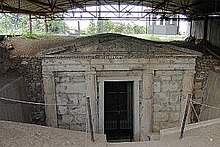- For other places with the same name, see Macedonia (disambiguation).
Macedonia (Greek: Μακεδονία) is a geographic and historical region in northern Greece.
Cities
[edit]
Western Macedonia
[edit]Central Macedonia
[edit]- 5 Veria — The city boasts a considerable number of Byzantine monuments
- 6 Edessa — Known for its impressive waterfall and close by spa area
- 7 Thessaloniki — The second largest city in Greece with a history of over 3,000 years
- 8 Serres - rural town with some Ottoman landmarks.
- 9 Naousa — The modern city is situated few km west of the ancient town of Mieza, the seat of the ancient School of Aristotle. of Macedonia and the place where Alexander the Great was proclaimed king, short after Philip's assassination in 336 BC.
- 10 Platamonas - popular seaside resort
- 11 Katerini - Supply center in the area without attractions
- 12 Litochoro - Village on Mount Olympus
- 13 Leptokarya — Beach resort town. Located near ancient Livithra, allegedly the home of Orpheus, a legendary musician in Greek mythology.
- 14 Asprovalta - popular seaside resort
- 15 Amphipolis — Archaeological site along the Via Egnatia
Eastern Macedonia
[edit]Other destinations
[edit]Western Macedonia
[edit]- 1 Prespa — The Prespa Lakes region is a natural park of great significance due to its biodiversity and endemic species
- 1 Lake Orestiada- Lake Orestiada is home to a 200 different species, among them, some rare and some endangered, it surrounds the city of Kastoria
- 2 Dragon's Cave - where you’ll get to see seven underground lakes and rooms with astonishing stalactites, near the city of Kastoria
- 3 Lake Gkistova- the highest alpine lake in Greece, located to the western end of Kastoria regional unit, near the peak of Grammos mountain
Central Macedonia
[edit]- 2 Chalkidiki — The No.1 tourist area in northern Greece
- 3 Olympos National Park (with Litochoro) — Τhe base for climbing Mt Olympus
- 4 Dion (Pieria) — An ancient city and sanctuary dedicated to Zeus. Philip II and Alexander the Great celebrated victories in Dion.
- 5 Vergina — The ancient Aigai, the first capital of Macedonia and the place where Alexander the Great was proclaimed king, short after Philip's assassination in 336 BC.
- 6 Megaplatanos — A rural village between the Pozar thermal baths (5 km) and the Voras ski resort (40 km).
- 7 Pella — Ancient Pella was the birthplace of Alexander the Great. The modern municipality Pella includes the large town Giannitsa.
Eastern Macedonia
[edit]- 8 Philippi Archaelogical site - most significant archaeological site in northern Greece because of its importance for the spread of Christianity in Europe
- 9 Nestos Natural reserve area - unique bird life and scenic landscapes
- 10 Pangaion Hills - Mountain area of 2000m height with many monasteries and famous archaeolological sites like Amphipolis
Understand
[edit]
Macedonia is the largest and second-most-populous Greek region, with a population of about 2.4 million of which alone 1 million live in Thessaloniki. The region is highly mountainous, with most major urban centres such as Thessaloniki and Kavala being concentrated on its southern coastline. Macedonia incorporates most of the territories of ancient Macedon, a kingdom ruled by the Argeads and whose most celebrated members were Alexander the Great and his father Philip II. Although it has very scenic areas and many very interesting cultural sites, it is visited by relatively few tourists, except the Chalkidiki and Olympos region.
When speaking with Greeks about Macedonia it is better not to participate in any discussion or to disagree that the name Macedonia is only Greek if you want to maintain a friendly atmosphere. Greeks are patriots and do not want any historical teachings on this sensitive topic. Although the name issue with the neighboring state of North Macedonia is now politically resolved, many Greeks still find it a betrayal of their history. This was reinforced by the creation of statues of Alexander the Great in Skopje and the use of symbols from Greek excavations by the neighboring state. Many Greeks wonder why the majority-Slavic population of the neighboring state uses purely Greek symbols and national heroes for their nationality awareness. Equally, many ethnic Macedonians (i.e., Greek citizens who speak the Macedonian Slavic language) are at a loss to understand why Greece denies their existence and forbids the promotion and teaching of their native language.
Talk
[edit]Greek is the official language of Greece and, thus, the majority of the inhabitants of Macedonia speak it as their native language. English is spoken by many people, usually under the age of 40, mostly in big cities like Thessaloniki or in tourist resorts like Chalkidiki. A minority of around 10,000 citizens, including most of the residents of around half the villages in the Florina district, speak the Macedonian language that's also spoken in North Macedonia, though see "Understand" above for why it is better not to mention that in discussions with locals you don't know very well.
Get in
[edit]Get around
[edit]See
[edit]
- Archaeological Site of Aigai in Vergina, a UNESCO World Heritage site
- Archaeological Site of Philippi near Kavala, a UNESCO World Heritage site
Do
[edit]- Wine Route of Naoussa. Check-out the wineries along this panoramic route, especially if you go by car.
- Most visitors come to Greece to spend beach holidays. If you want to travel out of season, be aware that many resorts outside the season are in a kind of hibernation and only a few restaurants and shops have opened. Who wants to travel at this time should choose larger towns as destination, since here at least a basic tourist service is guaranteed.
Eat
[edit]Drink
[edit]Stay safe
[edit]Go next
[edit]- Rhodope Mountains National Park - very interesting scenic lonely wooded mountain landscape with many ancient Thracian cult places

